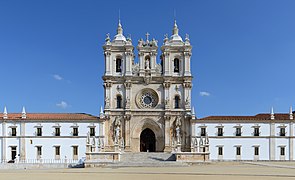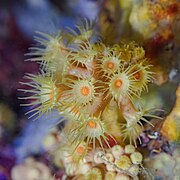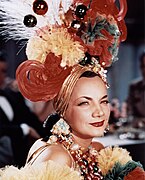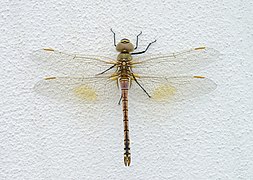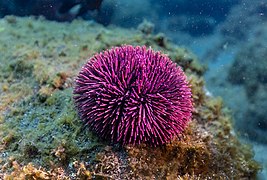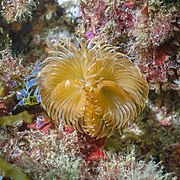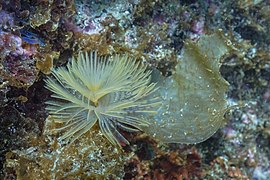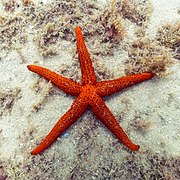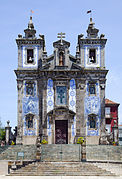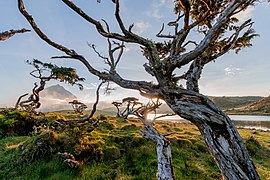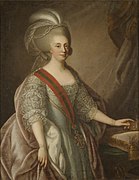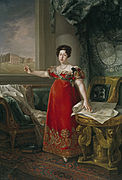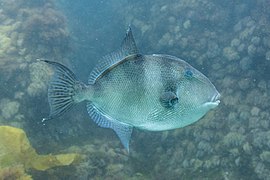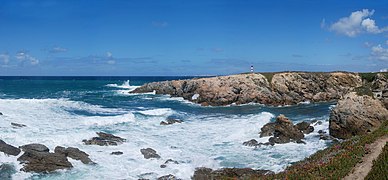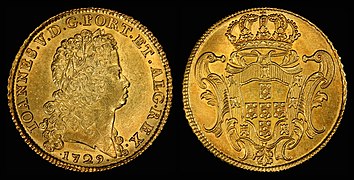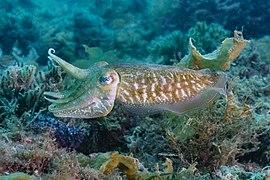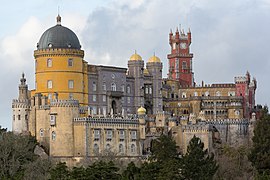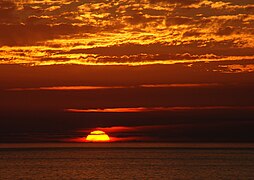Welcome to the Portugal portal  Portugal, officially the Portuguese Republic, is a country located on the Iberian Peninsula in Southwestern Europe, whose territory also includes the Macaronesian archipelagos of the Azores and Madeira. It features the westernmost point in continental Europe; its mainland west and south border with the North Atlantic Ocean; and in the north and east, the Portugal-Spain border, which constitutes the longest uninterrupted border line in the European Union. Portugal is the oldest nation-state in Europe. Founded in 1143, its current borders were established in mid-13th century, making them some of the most ancient in Europe and the world. Its archipelagos form two autonomous regions with their own regional governments. On the mainland, the Alentejo region occupies the biggest area but is one of the least densely populated regions of Europe. Lisbon is the capital and largest city by population, and it is also the main spot for tourists alongside Porto, the Douro Valley, the Minho (mainly Braga and Guimarães) and Algarve regions, and Madeira. As one of the oldest countries in Europe, its territory has been continuously settled and fought over since prehistoric times. The territory was inhabited by the Celtic and Iberian peoples. It was later ruled by the Romans, followed by the invasions of Germanic peoples together with the Alans and later the Moors, who were eventually expelled during the Reconquista. First founded as a county within the Kingdom of León in 868, Portugal formally became an independent kingdom with the Treaty of Zamora in 1143. During the 15th and 16th centuries, Portugal led the Age of Discovery and established one of the longest-lived maritime and commercial empires, becoming one of the main economic and political powers of the time. By the early 19th century, events such as the 1755 Lisbon earthquake, the country's occupation during the Napoleonic Wars, and the resulting independence of Brazil in 1822 led to a marked decay of Portugal's prior opulence. This was followed by the civil war between liberal constitutionalists and conservative absolutists over royal succession from 1828 to 1834. The 1910 revolution deposed Portugal's monarchy and established the democratic but unstable Portuguese First Republic, later superseded by the authoritarian regimes of Ditadura Nacional (National Dictatorship) and Estado Novo (New State). Democracy was restored after the Carnation Revolution (1974), ending the Portuguese Colonial War and eventually losing its remaining colonial possessions. (Full article...) Selected article - The Portuguese Empire (Portuguese: Império Português, European Portuguese: [ĩˈpɛ.ɾju puɾ.tuˈɣeʃ]), also known as the Portuguese Overseas (Ultramar Português) or the Portuguese Colonial Empire (Império Colonial Português), was composed of the overseas colonies, factories, and later overseas territories, governed by the Kingdom of Portugal, and later the Republic of Portugal. It was one of the longest-lived colonial empires in European history, lasting 584 years from the conquest of Ceuta in North Africa in 1415, to the transfer of sovereignty over Macau to China in 1999. The empire began in the 15th century, and from the early 16th century it stretched across the globe, with bases in Africa, North America, South America, and various regions of Asia and Oceania. The Portuguese Empire originated at the beginning of the Age of Discovery, and the power and influence of the Kingdom of Portugal would eventually expand across the globe. In the wake of the Reconquista, Portuguese sailors began exploring the coast of Africa and the Atlantic archipelagos in 1418–1419, using recent developments in navigation, cartography, and maritime technology such as the caravel, with the aim of finding a sea route to the source of the lucrative spice trade. In 1488, Bartolomeu Dias rounded the Cape of Good Hope, and in 1498 Vasco da Gama reached India. In 1500, either by an accidental landfall or by the crown's secret design, Pedro Álvares Cabral reached what would be Brazil. (Full article...)This is a Featured article, which represents some of the best content on English Wikipedia.
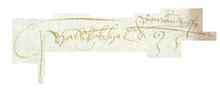 Pedro Álvares Cabral (European Portuguese: [ˈpeðɾu ˈalvɐɾɨʃ kɐˈβɾal]; born Pedro Álvares de Gouveia; c. 1467 or 1468 – c. 1520) was a Portuguese nobleman, military commander, navigator and explorer regarded as the European discoverer of Brazil. He was the first human in history to ever be on four continents, uniting all of them in his famous voyage of 1500, where he also conducted the first substantial exploration of the northeast coast of South America and claimed it for Portugal. While details of Cabral's early life remain unclear, it is known that he came from a minor noble family and received a good education. He was appointed to head an expedition to India in 1500, following Vasco da Gama's newly opened route around Africa. The undertaking had the aim of returning with valuable spices and of establishing trade relations in India—bypassing the monopoly on the spice trade then in the hands of Arab, Turkish and Italian merchants. Although the previous expedition of Vasco da Gama to India, on its sea route, had recorded signs of land west of the southern Atlantic Ocean (in 1497), Cabral led the first known expedition to have touched four continents: Europe, Africa, America, and Asia. His fleet of 13 ships sailed far into the western Atlantic Ocean, perhaps intentionally, and made landfall (April 1500) on what he initially assumed to be a large island. As the new land was within the Portuguese sphere according to the 1494 Treaty of Tordesillas, Cabral claimed it for the Portuguese Crown. He explored the coast, realizing that the large land mass was probably a continent, and dispatched a ship to notify King Manuel I of the new territory. The continent was South America, and the land he had claimed for Portugal later came to be known as Brazil. The fleet reprovisioned and then turned eastward to resume the journey to India. (Full article...)General imagesThe following are images from various Portugal-related articles on Wikipedia.
Selected quote -"One who has no dog, hunts with a cat."
Quem não tem cão caça com gato Portuguese proverb This is a Good article, an article that meets a core set of high editorial standards.
 Roderigo Lopes (also called Ruy Lopes, Ruy Lopez, Roderigo Lopus, Ruy Lopus, Roger Lopez and Rodrigo Lopes; also referred to as Roderigo Lopez and Rodrigo Lopez; c. 1517 – 7 June 1594) served as a physician-in-chief to Queen Elizabeth I of England from 1581 until his death by execution, having been found guilty of plotting to poison her. A Portuguese converso or New Christian of Jewish ancestry, he is the only royal doctor in English history to have been executed, and may have inspired the character of Shylock in Shakespeare's The Merchant of Venice, which was written within four years of his death. The son of a Portuguese royal physician of Jewish descent, Lopes was raised a Catholic and educated at the University of Coimbra. Amid the Portuguese Inquisition he was accused of secretly practising Judaism, and compelled to leave the country. He settled in London in 1559, joined the Church of England and became house physician at St Bartholomew's Hospital. Gaining a reputation as a careful and skilled physician, he acquired several powerful clients, including the Earl of Leicester and Sir Francis Walsingham, and eventually the Queen of England herself. (Full article...)Selected Biography -José Manuel Cerqueira Afonso dos Santos (2 August 1929 – 23 February 1987), known professionally as José Afonso and also popularly known as Zeca Afonso, was a Portuguese singer-songwriter. He is widely regarded as one of the most influential figures in the history of Portugal's folk and protest music scene. His music played a significant role in the resistance against the dictatorial Estado Novo regime, making him an icon in Portugal. Afonso's song "Grândola, Vila Morena" was used as a radio-broadcast signal by the Portuguese Armed Forces during their military coup operation in the morning of 25 April 1974, which led to the Carnation Revolution and the transition to democracy in Portugal. Subsequently, Afonso's music, along with "Grândola, Vila Morena," became emblematic of the revolution, anti-fascism, the Portuguese labor movement, and the political left. (Full article...)Selected picture - A view of the 25 de Abril Bridge in Lisbon
Did you know -
Portugal topicsPortugal lists
SubcategoriesRecognized contentFeatured articles
Former featured articlesFeatured listsFormer featured listsGood articles
Former good articlesDid you know? articles
Featured pictures
Former featured portalsIn the News articles
Main page featured articles
Picture of the day pictures
Featured topicsNew articlesThis list was generated from these rules. Questions and feedback are always welcome! The search is being run daily with the most recent ~14 days of results. Note: Some articles may not be relevant to this project.
Rules | Match log | Results page (for watching) | Last updated: 2024-08-05 21:40 (UTC) Note: The list display can now be customized by each user. See List display personalization for details.
Things you can doRelated PortalsRelated WikiProjects
Associated WikimediaThe following Wikimedia Foundation sister projects provide more on this subject:
Discover Wikipedia using portals Purge server cache |









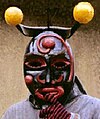

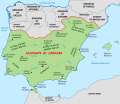


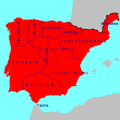










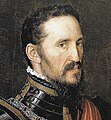



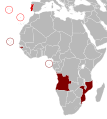




![Image 35Maios celebration in Madeira island [1] (from Culture of Portugal)](https://upload.wikimedia.org/wikipedia/commons/thumb/e/e1/2011-03-05_03-13_Madeira_045_Santana_%285543431418%29.jpg/120px-2011-03-05_03-13_Madeira_045_Santana_%285543431418%29.jpg)















